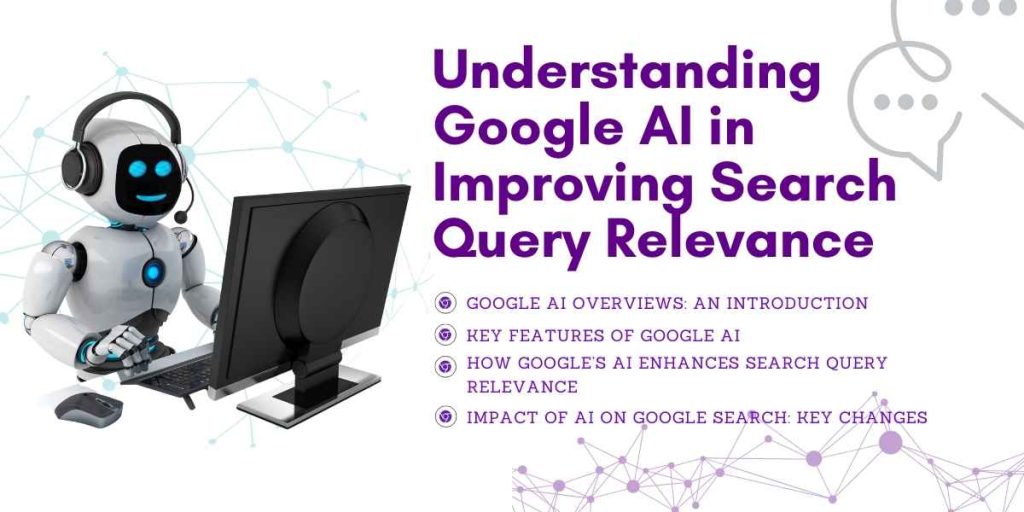How Blockchain Technology is Shaping Digital Marketing The digital marketing landscape is not steady, it is constantly evolving and changing. The new technologies are redefining how businesses connect with their...
Read More
In the fast-evolving world of search technology, Google AI plays an important role in improving the relevance of search results. From understanding user intent to delivering high-quality personalized experiences, AI in Search has transformed how we access information. Google implemented passage understanding, a breakthrough that allows the search engine to analyze and rank individual passages within web pages, not just entire documents. (A blog on “Blog.Google’’} This improvement encourages highly specific searches, helping users find relevant information even when it’s deeply buried in a page. This change is estimated to improve around 7% of all search queries globally.
Research by BrightEdge highlights how AI Overviews (AIO), powered by advanced technologies, enhance query relevance by integrating Featured Snippets and understanding structured data.
This blog dives deep into the details of how Google algorithms and AI have redefined search query relevance, and their impact on search engine optimization with AI. We will also discuss, what the future of search technology looks like for users and digital marketers.
Google AI is a collection of artificial intelligence technologies and algorithms specifically designed to make search more intuitive, accurate, and user-centric. By leveraging natural language processing (NLP), machine learning (ML), and deep learning, AI-driven search enhancements enable Google to assess user’s queries better and deliver results that match user intent.
BERT was introduced in 2019 and stands for Bidirectional Encoder Representations from Transformers marking a major leap in AI-powered search by focusing on the context of words in a query rather than treating them individually. This feature allows Google to better interpret nuanced and conversational queries, making results more accurate and helpful.
For Example, A query like “How to look tall without wearing heels or taking supplements?” is now understood in its entirety, improving result accuracy.
MUM is an advanced AI in Search technology that goes beyond textual understanding. It processes information across multiple languages and supports various formats like text, images, and videos.
For Example, A search query about running shoe recommendations may return insights from global sources, videos, and blogs, delivering a detailed answer.
With the rise of smart assistants like Alexa, Siri, Google Home, etc voice search has become integral to the future of search technology. Google AI interprets spoken queries, which are often longer and in a conversational format, making results more aligned with user intent.
AI-driven search enhancements have transformed SERPs from static lists to interactive, information-rich pages. Attractive features like People Also Search For, Rich Snippets, and Knowledge Panels are powered by advanced Google algorithms and AI, making information more valuable, accessible, and engaging.
To help brands to rank high on SERPs, digital marketers must adapt to the impact of AI on Google Search by focusing on:
As Google’s AI technology evolves, here’s what we can expect while searching on this search engine:
For digital marketers, the integration of AI advancements in SERPs means they have to stay ahead of trends and optimize for quality over quantity. Understanding Google AI in enhancing search query relevance involves embracing tools like NLP and machine learning to refine SEO strategies to improve visibility or rank on SERPs.
The entry of artificial intelligence in Google search rankings has made search more user-focused and intelligent than ever. With every innovation, Google Search AI Updates push the boundaries of what’s possible or more relevant for users, offering a glimpse into the future of search technology. For users, it means better answers and for marketers, it means evolving SEO strategies.
By aligning with AI-powered search, businesses can thrive in the competitive and ever-changing landscape of search engine optimization, leveraging the power of AI for long-term success.
How Blockchain Technology is Shaping Digital Marketing The digital marketing landscape is not steady, it is constantly evolving and changing. The new technologies are redefining how businesses connect with their...
Read MoreBoosting SEO with Schema Markup: A Beginner’s Guide In the competitive business world, small and medium-sized businesses (SMBs) must manage customer relationships effectively to ensure sustainable growth and drive profits....
Read MoreWhy Gamification is the Next Big Thing in Customer Engagement In today’s digital space, grabbing customer’s attention and holding it is a challenge for businesses. Changing priorities of customers encourages...
Read More